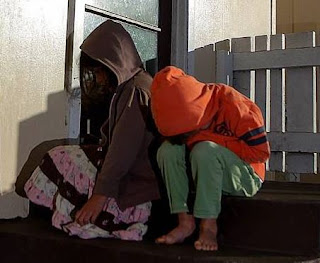 |
| No Jesus Here. |
She rises, unrested, and steps
Onto the narrow balconyTo find the day. To greet
The Sunday God she sings to.
But this morning His face is clouded.
Grey and wet as a corpse
Washed by tears.
Behind her, in the tangled bedding,
the children bicker and whine.
Worrying the cheap furniture
Like hungry puppies.
They clutch at her threadbare gown
with hands as insistent and
unforgiving as the clock’s.
She wishes she could dream.
Finding in the darkness
A life unaided by
The office lights’ bleak florescence,
The whining of the vacuum cleaner,
The endless emptying and
Refilling of rubbish bins.
Last night she paused, panting.
Held captive by a single word
‘Wellbeing’. A selfish word.
Comfortable and sated.
A word accustomed
To feeling well and being safe.
A word with a working lock.
Budgeting was something
They made her do at WINZ.
Recalling the Miracle of
The Loaves and Fishes.
Jesus feeding five thousand.
She’d settle for food to feed
Five hungry children.
Was that happening today?
A budgeting miracle?
Housing found? Children fed?
The man from the adjoining unit,
Heading for the bus-stop,
Eyes her narrowly.
No Jesus here.
Chris Trotter
19 May 2022
This poem was originally posted on The Daily Blog of Thursday, 19 May 2022.

7 comments:
Michael Cullen: every pressure group complains “not enough”, the Opposition laments a missed opportunity (to lower taxes) and life goes on as before.
The horror is that those with power to make change slide away to more worthwhile tasks measured by their route to greater income and power. 'The poor are always with us'......I am now thinking of the economic and political perpetrators as snails, self-sufficient and preserving their good condition, well-housed and not noticeable usually except their slime trails show where they have been.
Matthew 7:9 - Wikipedia
https://en.wikipedia.org › wiki › Matthew_7:9
Or what man is there of you, whom if his son ask bread, will he give him a stone?
I remember a story from somewhere. A man was staying in a hotel with a courtyard where there were pigeons and a woman used to come every day and throw crumbs to them. He felt prompted to give her some funds to pay for bread for this. She continued to feed the birds but still with limited bread and he asked her why she wasn't using his contribution. She replied that she had - to feed her children. They were very poor and her children were not as well fed as the birds. Did he only care about birds, and not at all for children, she asked?
We are all inclined to be particular and channel our imagined generosity and women and children who are the basis of our society are often disdained when in need. Odd isn't it!
But did not Jesus say that rather than relying on gifts of fish from him to eat -
the needy should be prepared (taught) to catch (i.e. work for) the fish they need ?
Do really most of the contributors here belong to the "give us more" needy ?
It is high time we systematically switch to higher personal and national wealth ownership creative savings rates for more useful productivity raising or maintenance investment and debt repayment ability - and poverty elimination eventually - with all of us participating in the effort.
The latter is achievable through the taxation system, as has been modestly initiated already through the NZ Super Fund and KiwiSaver.
Who fathered the five children and why are they not contributing to their support? There is no future in paying people to breed other than intractable poverty and a multi-generational underclass, as the last 50 years have amply shown.
There is one terrifying bit of information from yesterday. I heard it from Robertsons interview - that 82% of working New Zealanders get some form of welfare.
Another bit of info is that compared to 1950 Maori socio-economic status is worse today than the comparative position in 1950. Welfare has rocketed since 1950
Its reasonable to conclude that welfare only makes things worse.
"Its reasonable to conclude that welfare only makes things worse."
No, on the contrary it's reasonable to conclude that New Zealand businesses are so inefficient and reliant on cheap labour that they can't afford to pay a decent living wage to many people in our society, leaving them with no alternative but to get some form of welfare. New Zealand businesses have far too long relied on the state to give them cheap labour, training, and tax breaks of one sort or another. Per capita productivity is lamentably low because of this.
Mind you, it is arguable that we were all better off in 1950 – before Roger Douglas and his crew set out to wreck the NZ economy.
Post a Comment